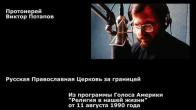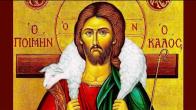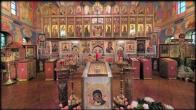You are here
Introduction
If ye love Me, keep My Commandments. John 14:15
[The term Commandments of Blessedness is a literal translation from the Old Church Slavonic words usually translated into English as Beatitudes. Another literal translation from an Old Church Slavonic term is Gift of Good Things that are Useful, but we have instead used the term Blessings. We have translated in this way to emphasize the link between commandments, blessings, and blessedness.]
The Old Testament commandments concerning God and neighbor were a revelation of Law as the basis of moral life. They did not disclose the inner Love of God's Law to mankind. The New Testament disclosed Love as the true Law in the person of Jesus Christ--God Himself Who had become man--and in His life and teaching.
The descent of the Holy Spirit on the day of Pentecost brought the Perfect Love that could dwell in the hearts of Christians in the Church that the Holy Spirit founded for them that day. The God, Which had united with mankind in Jesus Christ, united mankind with the God in The Church. According to Saint Irenaeus of Lyons, the new fellowship of man with God was God's adoption of man. The suffering of Jesus Christ relieved mankind of responsibility for all sins, lifting sinful people from death towards a truly moral and eternal life.
Christ has made possible the gift of these blessings to all men and women without exception. These blessings are not forcible thrust on anyone. But everyone in fellowship with Jesus Christ may have them; that is, everyone who tries to fulfill His commandments and who lives in the Church, nourished by Her holy Mysteries. In commentary, Archimandrite Sophrony (Sakharov) has written--
"The commandments of Christ are in essence the self-revelation of God. Expressed in earthly words, they seem to us to be relative, but he who keeps them in a proper manner is set by them on the boundary between the relative and the unconditional, the finite and the infinite, the determinate and the absolute. To follow these injunctions, which are not enjoined through force, far exceeds our creaturely powers. It is necessary that the Almighty, Who has revealed Himself to us, would Himself, through His efficacious indwelling within us, raise us up to the sphere proper to Him of absolute, unconditioned Existence: I am the vine, ye are the branches: He that abideth in Me, and I in him, the same bringeth forth much fruit: for without Me ye can do nothing ( John 15:5)." "To See God as He I"s, p. 69.
According to the Savior's promise, each member of Christ's Church--each branch of the Vine--or the Body of Christ, in whose soul, the Holy Spirit lives, can reach moral perfection by fulfilling Christ's call: Be ye therefore perfect, even as your Father which is in heaven is perfect (Matthew 5:48). The Christian starts to realize this ideal when the he begins to acquire the Holy Spirit, Who teaches everything, comforts in everything, in everything helps and directs, and makes joyous all things, according to the remarkable words of Saint Seraphim of Sarov.
The perfect example of total morality is the Person and Life of the Savior, which summed up the spiritual goals of the whole ancient world, especially of the peoples of Abraham and Moses. All their moral strength had coalesced in their hope of the Messiah, who came to the world as Christ the Savior. Christ was their Alpha and Omega--their beginning and end. Christ came into the world in order to bring us to His Father. For God so loved the world--we read in the Gospel according to John--that he gave his only begotten Son, that whosoever believeth in him should not perish, but have everlasting life (John 3:16).
The spiritual life in Christ is not thrust forcibly, but is given to whoever seeks it with moral exertion. Whoever seeks, whoever applies personal moral exertion, will find it without fail, according to the promise of the Savior, Who said in his Sermon on the Mount:
"Ask, and it shall be given you; seek, and ye shall find; knock, and it shall be opened unto you: for every one that asketh receiveth; and he that seeketh findeth; and to him that knocketh it shall be opened. Or what man is there of you, whom if his son ask bread, will he give him a stone? Or if he ask a fish, will he give him a serpent? If ye then, being evil, know how to give good gifts unto your children, how much more shall your Father which is in heaven give good things to them that ask him? (Matthew 7:7-11)"
The holy Fathers of the Church wrote about the human moral effort needed to fulfil God's commandments. Here is what Theophan the Recluse, the Russian spiritual writer of the last century, wrote in his Foreword to Unseen Warfare:
He who has repented gives himself over to serving God; and immediately he begins to serve Him by walking is His commandments and in His will. The commandments are not heavy, but many obstacles are encountered in fulfilling them in the external circumstances of the laborer and especially in his internal inclinations and habits. The laborer himself does everything, although with God's help, by giving himself up to devotion to God's will, or by committing himself to God's all--effectualness.
Saint Theodore of Edessa wrote that--"By keeping the commandments of Christ we do not convey anything to Him, Who has no need for anything and is the Giver of all good things, but we benefit ourselves, earning for ourselves life eternal and the enjoyment of unspeakable good things."
Saint Simeon the New Theologian wrote that God requires nothing except that we not sin:
But this is not the fulfilling of the Law, Saint Simeon writes further, but only the inviolable preservation of the image and lofty dignity, in which standing by nature and bearing the brightly shining garment of the Spirit, we abide in God and He in us, we become gods by grace and sons of God and are signed with the light of the knowledge of God, according to the word: The light of Thy countenance, O Lord, hath been signed upon us (Psalm 4:7).
When someone actively labors to fulfil commandments, writes Saint Nicetas Stethatos, suddenly he is filled with joy unspeakable and ineffable, so that he himself is changed by a certain wondrous and inexpressible change, and, as if divested of the burden of the body, he will forget about food, sleep and other needs of nature: then let him know that it is God's visitation to him, which in strugglers produces a life-creating mortification and through this brings them in to the state of the flesh less ones. The author of such a blessed life is humility; the nourisher and mother--holy compunction; the friend and sister contemplation of the divine light; the throne--passionle***ess; the end--God, the Most Holy Trinity.
The monks Callistus and Ignatius wrote that we need readiness to sacrifice everything for God's commandments: When the time requires it, they wrote, we must eagerly destroy even our own souls, that is, not spare even our own lives, as the Lord Himself says: Whosoever shall lose his life for my sake and the gospel's, the same shall save it (Mark 8:35).
These clear statements show that Christian moral law is a living, energy-filled force, the good news about salvation and eternal blessedness in the Kingdom of Heaven, the perfect happiness, toward which all people strive.
Some people define their happiness in mundane accomplishments and talents, others in beauty, glory, wealth, authority over people, in the honor and esteem shown them by those around them, in love, in family life, and so forth. Sometimes people even attain such happiness, but it is short and illusory. Every such mundane happiness is precarious and not genuine. True happiness is intransigent and eternal. According to the teaching of Christ, true happiness is the Kingdom of Heaven. To be happy means to be a member of God's Kingdom, to live with God. God's Kingdom begins here on earth now, and continues fully realized in heaven, in eternity. There is no end to happiness in the Kingdom of Heaven. No one can take it away, no kind of chance has any operation. Happiness is blessedness: perfect goodness, beauty and eternal love.
Saint Gregory of Nyssa, a Church Father from the fourth century, used these words:
"Blessedness is the totality and plenitude of everything that is good and that is desired as good, without a single deficiency, deprivation or impediment... The followers of Christ not only await blessedness, as something belonging to the future, but it is characteristic of their soul, as something present, insofar as Christ Himself is present in them."
Blessedness may also be called that happy, ineffable condition of highest joy, when the human spirit is so elevated that it ceases to depend on anything that might disturb it. According to the word of the Apostle Paul: Eye hath not seen, nor ear heard, neither have entered into the heart of man, the things which God hath prepared for them that love him (I Corinthians 2:9).
Blessedness is being bound closely, firmly to God, dependent entirely. In the fifth verse of 64th psalm we read: Blessed is he whom Thou hast chosen and hast taken to Thyself; he shall dwell in Thy courts. The 15th psalm assures us that Thou wilt fill me with gladness with Thy countenance; delights are in Thy right hand for ever (verse 11). Blessedness belongs to those who have attained the Kingdom of God, for, according to Christ's word, the Kingdom of God is within you.
Thus, the Christian believer can enjoy the beginning of blessedness already on earth. The tranquility of soul and sweetness that we feel at times in God's church are an advance on that endless sweetness which they will experience eternally who contemplate the goodness of God's countenance, so teaches the holy and righteous John of Kronstadt.
Christian life means good works as well as blessed feelings. Such is the will of God; such is His plan for man. In order to teach us, Christ offered nine short teachings--Commandments of Blessedness--that name all the virtues that lead to blessedness, mapping out the path for spiritual renewal. The Savior gives this divine revelation in his Sermon on the Mount, set in the 5th, 6th and 7th chapters of the Gospel according to Matthew, with a part of the Sermon given also in the 6th chapter of the Gospel according to Luke. Parallel to the commandments of Moses, they acre called the Commandments of Christ. Moses' ancient Ten Commandments were written on tablets of stone for objective study, but the Christ's Commandments of Blessedness are written by the Holy Spirit in the hearts of the faithful.
Blessed are the poor in spirit, for theirs is the Kingdom of Heaven
Blessed are they that mourn, for they shall be comforted.
Blessed are the meek, for they shall inherit the earth.
Blessed are they that hunger and thirst after righteousness, for they shall be filled.
Blessed are the merciful, for they shall obtain mercy.
Blessed are the pure in heart, for they shall see God.
Blessed are the peacemakers, for they shall be called sons of God.
Blessed are they that are persecuted for righteousness' sake, for theirs is the Kingdom of Heaven.
Blessed are ye, when men shall revile you, and persecute you, and shall say all manner of evil against you falsely, for My sake.
Although the human race may still seek to return nostalgically to the rejected moral truth of the life of Christ, so often man stops before accepting Christian revelation. But to the rest of us, the Sermon and Commandments of Blessedness sound like heavenly music. I repeat. The Commandments of Blessedness are thrust forcible on no one, but they call all men. To attain eternal blessedness, we need these pre-eminent virtues: humility, repentance, meekness, thirst for righteousness, mercy, purity of heart, peacemaking, suffering for the truth, and martyrdom for the Faith.
These truths are beautiful and holy. We can begin to experience blessedness only by immersing ourselves in them. Whoever approaches the Commandments of Blessedness and the rest of Sacred Scripture, to him Christ has promised-- Blessed are they that hear the word of God, and keep it (Luke 11:28).
©Archpriest Victor Potapov
October 1992
PARISH LIFE
Address of our Cathedral
Subscribe to our mailing list
While all the materials on this site are copyrighted, you may use them freely as long as you treat them
with respect and provide attribution on the Russian Orthodox Cathedral of St.John the Baptist of Washington DC.









